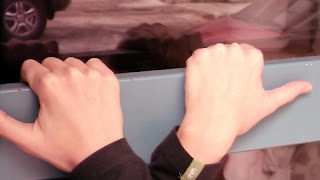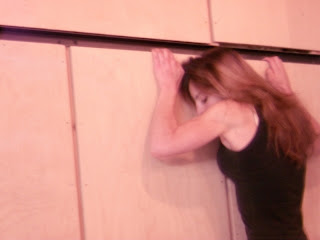 The general strikes almost defeat us, but 7 of us are here.... Thinking back on the challenges of Athens these days I offer just one thought to them: we cannot build a future if we destroy the present ...a direct prompt to a talk about how if we look back on the tasks of 'me yesterday impinges upon me today and bears upon my tomorrow' we are actually able to begin articulating the specificity of the contribution of dance to current society... if we approach dance/choreography as a particular discipline/knowledge (not choreography as a generic paradigm) that through engaging with/through it helps us understand a context and variables, choices, restrictions, memory etc and the effect on this SPECIFICALLY on the body (as opposed to bees and cars and other systems that are at times used to define choreography that forget the issues of the body) and consider the diverse scales of operations it (this body - me, you, historical, here now, real) is required to enter into, in ways, methods and means that no other discipline can or has, then we may begin to claim a need for this art to continue to exists in theatres, in studios, in universities...but we need to grab the bull by the horns and articulate this..... I can see the minds in the group clicking, the penny dropping, quiet nods of agreement....I am now, I think, ready to write/record this thing that has been evading me, about dance and (not) languages and the need to articulate our specificity not our generality, the need for dance linked with the desire to dance.... We acknowledge that we enter into a different perspective, whereat the artists on stage/studio/university/communities are showing, demonstrrating through all aspects of their practice, how to find a way to create, to operate, to generate in a world that seems ever fluid and collapsing; these artists are not saying anything as such, in the reductive way in which this is used to consider the impact of dance. We switch from readings to witnessing.... there is so much mention of this but so little discussion of the implications of this shift in perspective...to what we are, what we do, how it works, how we grow in and through it....
The general strikes almost defeat us, but 7 of us are here.... Thinking back on the challenges of Athens these days I offer just one thought to them: we cannot build a future if we destroy the present ...a direct prompt to a talk about how if we look back on the tasks of 'me yesterday impinges upon me today and bears upon my tomorrow' we are actually able to begin articulating the specificity of the contribution of dance to current society... if we approach dance/choreography as a particular discipline/knowledge (not choreography as a generic paradigm) that through engaging with/through it helps us understand a context and variables, choices, restrictions, memory etc and the effect on this SPECIFICALLY on the body (as opposed to bees and cars and other systems that are at times used to define choreography that forget the issues of the body) and consider the diverse scales of operations it (this body - me, you, historical, here now, real) is required to enter into, in ways, methods and means that no other discipline can or has, then we may begin to claim a need for this art to continue to exists in theatres, in studios, in universities...but we need to grab the bull by the horns and articulate this..... I can see the minds in the group clicking, the penny dropping, quiet nods of agreement....I am now, I think, ready to write/record this thing that has been evading me, about dance and (not) languages and the need to articulate our specificity not our generality, the need for dance linked with the desire to dance.... We acknowledge that we enter into a different perspective, whereat the artists on stage/studio/university/communities are showing, demonstrrating through all aspects of their practice, how to find a way to create, to operate, to generate in a world that seems ever fluid and collapsing; these artists are not saying anything as such, in the reductive way in which this is used to consider the impact of dance. We switch from readings to witnessing.... there is so much mention of this but so little discussion of the implications of this shift in perspective...to what we are, what we do, how it works, how we grow in and through it.... We continue with a group discussion of questions and ideas that came out of the first research explorations on Tuesday, in particularly the evolution of tasks and their 'language' and the importance of what I called in the previous post 'the effect it has on a body', not just the movement produced (whereby the body is made invisible by the production of movement). We spend time discussing choice, the need artistically and politically to differentiate between conditions and choice, one affects the other but do not predetermine the outcome (see Hannah Arendt on this in The Human Condition, and a publication that links these ideas to choreographic practice here). One choice does not merely open another, but multiple choices; a research attitude allows us to confidently pursue various options, test, evaluate, go back, discard, as that is precisely the point. We dig further on the difference between instruction and task; I finally come up with a rough distinction: an instruction knows its outcome (think of sports), a task questions its very understanding of what the rule is, for an outcome that is not yet fully disclosed and which it is searching.... maybe this is why sports are government maintained, in spite of the 'bad boys' publicity of players they are actually lambs, following...go back to my comment on Benjamin and revolutions in earlier posts... Ahh the artist that questions the rule...ahhhh politically complex place...no wonder Plato wanted us out of the Republic. However, the very statement requires clarification: .we need to distinguish then between political and aesthetic nihilism/diletantism (breaking rules for the sake of it) and breaking rules as an issue of knowledge and self formation..(personal and social) you may need to read Brian Sutton-Smith The Ambiguity of Play (1997) at this point...
We continue with a group discussion of questions and ideas that came out of the first research explorations on Tuesday, in particularly the evolution of tasks and their 'language' and the importance of what I called in the previous post 'the effect it has on a body', not just the movement produced (whereby the body is made invisible by the production of movement). We spend time discussing choice, the need artistically and politically to differentiate between conditions and choice, one affects the other but do not predetermine the outcome (see Hannah Arendt on this in The Human Condition, and a publication that links these ideas to choreographic practice here). One choice does not merely open another, but multiple choices; a research attitude allows us to confidently pursue various options, test, evaluate, go back, discard, as that is precisely the point. We dig further on the difference between instruction and task; I finally come up with a rough distinction: an instruction knows its outcome (think of sports), a task questions its very understanding of what the rule is, for an outcome that is not yet fully disclosed and which it is searching.... maybe this is why sports are government maintained, in spite of the 'bad boys' publicity of players they are actually lambs, following...go back to my comment on Benjamin and revolutions in earlier posts... Ahh the artist that questions the rule...ahhhh politically complex place...no wonder Plato wanted us out of the Republic. However, the very statement requires clarification: .we need to distinguish then between political and aesthetic nihilism/diletantism (breaking rules for the sake of it) and breaking rules as an issue of knowledge and self formation..(personal and social) you may need to read Brian Sutton-Smith The Ambiguity of Play (1997) at this point... We revisit the task again, in order to find a third level of evolution which we will once again stop and formulate as a task (verbal) to pass on to another....the question remains focussed on concepts and practices, in this case really taking time to elucidate how practice affects the articulation of concepts (in the shape of a task). If they remained working on their own, they would be applying a more 'intuitive' approach to the evolution of the tasks (which perhaps would then only be reflected at the end of day). The shift from the 'intuitive' practice to the articulate exchange in process becomes important in order to identify the evolution of a working method (and its process)... We keep unpacking this practically, concepts to practice, practice to concepts, by walking blindfolded up and down Erechthiou St, climbing walls, wrapping the studio in a maze of string...
We revisit the task again, in order to find a third level of evolution which we will once again stop and formulate as a task (verbal) to pass on to another....the question remains focussed on concepts and practices, in this case really taking time to elucidate how practice affects the articulation of concepts (in the shape of a task). If they remained working on their own, they would be applying a more 'intuitive' approach to the evolution of the tasks (which perhaps would then only be reflected at the end of day). The shift from the 'intuitive' practice to the articulate exchange in process becomes important in order to identify the evolution of a working method (and its process)... We keep unpacking this practically, concepts to practice, practice to concepts, by walking blindfolded up and down Erechthiou St, climbing walls, wrapping the studio in a maze of string...
P.S. A happy accidental re-covery today: On the Arcades Project by Walther Benjamin:
"Benjamin set out to construct novel conceptions of historical time and historical intelligibility based on the relationship, not between the past and the present, but between the ‘then’ and the ‘now'...." ahh the dots are connected, concepts and practice once again.....